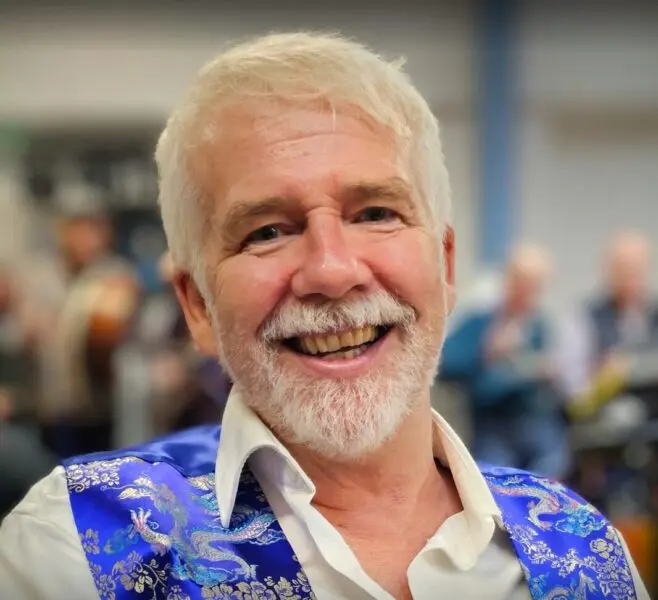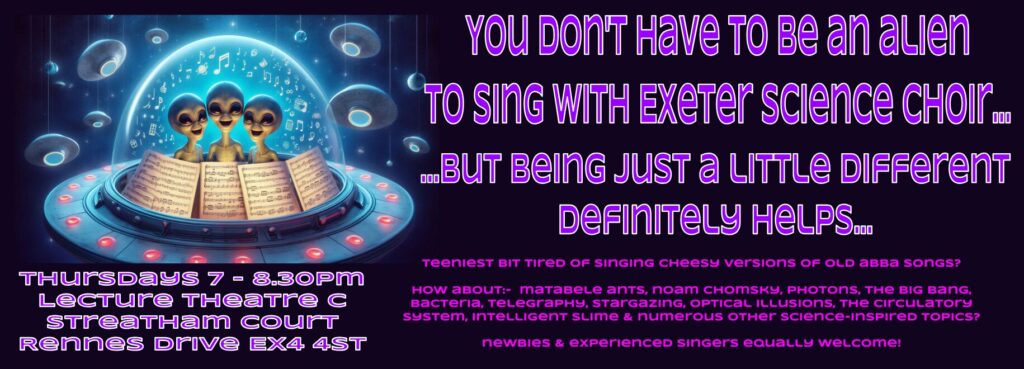
The world’s first-round science choir? Composer David Haines has scoured the web and is convinced it might be.
The open-to-all group, based in the halls of Exeter’s Streatham campus on Thursdays, provides a novel way of gelling constructive singing support with the much-promoted drive to educate the community on the wonders of science.
His second choir since moving to Devon in the early eighties, Haines sees his latest role – Exeter’s resident science songwriter – as a way to bring his passion to a wider audience. But the road wasn’t easy.
‘I was living in Brighton in 1981, and I was hunting around for science poems to set to music. And I couldn’t find anything. I wanted to write songs about science even then.
‘And I gave up. I actually gave up, and I wrote a series of songs about cities… with guitar and alto.
‘I’ve lost them… they were good, I think.’
Trading the city life for rural Tavistock marked a change in track, however. David found his first chance to slip science into his songs while writing for a children’s music theatre group he co-founded in Plympton, near Plymouth.
‘I thought, oh, I can write melodies and lyrics.
‘They rhyme, they scan. And I don’t know why I didn’t think I could, because I knew I was good at English. I always was.’
For him, the science bug bit young, reading books by Isaac Asimov and Arthur C Clarke. But even his early science fiction palette knew its bounds:
‘I would have nothing to do with Star Trek, nothing to do with Doctor Who,’ he explains, feeling the shows were ‘plastic fantasy stuff that had nothing really to do with science.
‘People tell me I’ve missed out a lot, but I don’t know… I’m still not interested.’
The real influence for Haines would prove to be The Hitchhiker’s Guide to the Galaxy.
‘That first came out when I was a teenager and I completely organised my life around not missing any episodes.
For David, this even included bath time…
‘I could lock myself in the bathroom, with the radio, the old transistor radio, listening to it. And I just lapped it up because I thought, not only was it hilarious, I still think it’s really good science fiction.
‘Because he [Douglas Adams] was so unfettered by convention or preconceptions of where science would go.’
The world of Hitchhiker’s Guide gave Haines a zest for the surreal that would permeate his work for the children’s group, and later his first choir – South Devon Singers.
I have my own little cliché… music is my language; science is my passion.
The Teignmouth- and Ivybridge-based choir is currently rehearsing his children’s musical, Granny Galactica, which Haines says is heavily inspired by the Guide.
‘It’s got some sort of attempt at the same sense of humour, and the eccentric characters and so on.’
Reflecting on his work, Haines explains, ‘I never write a song with the aim of teaching something. I get interested in the subject, and express my interest in it through writing a song.’
He then pauses for a moment, before recalling,
‘I have my own little cliché… music is my language; science is my passion.
A common theme through much of his work is the idea of progression; he will compose a series of songs, with each marking a different stage in a trail leading from one concept to another. Amoeba is a song in one of these sequences, Powers of Ten, and the subject of an uplifting encounter.
‘For the first time ever, I went to a chamber of trade, Dawlish Chamber of Trade. Coffee and cake networking morning today.
‘I just thought, OK, networking. I’ve always been absolutely crap at networking. I’m going to see whether I can do it.
‘And as I was leaving, the young woman who was behind the counter where they were serving the coffee said, “Have you ever had anything to do with a song about amoebae?”’
Haines’ recognition of a term given to microbes mostly found in ponds was instant.
‘I said, yeah, I wrote that. And she said, “I think we sang it at Dawlish Leisure Centre, didn’t we?”
‘Apparently, she still sings this song to herself, twenty-five years after she learned it at school.’

Interested, I ask him why he feels his songs have endured so long; was it because, unlike music we hear based on themes and trends of the now, science has the ability to transcend time, being built on unbreakable rules?
The truth was less poetic.
‘How interesting you say that, because that’s totally wrong.
‘There’s a song called Eras that I wrote 20 years ago. And at that time, as far as we knew, the biggest mammals to coexist with the dinosaurs were… little voles.
It’s not set in stone. Science is a process; it’s constantly changing.
‘And since then, they’ve found remains, fossils of mammals, like a big dog – that sort of size – that coexisted with the dinosaurs for millions of years. And so the science has changed.
‘My song was right when I wrote it, and it’s wrong now.
‘It’s not set in stone. Science is a process; it’s constantly changing.
‘There was a philosopher called Karl Popper… he came up with this concept that there’s no such thing as a science fact. It’s not real science unless it’s capable of being disproved.’
Haine’s series, Powers of Ten, is an upcoming project with Exeter Science Choir next year. The piece is based on progressing from little to grand in scale, from string theory to the cosmos, via the human body and even Brunel’s railways.
Exeter’s science choir meets every Thursday from 7pm to 8.30pm in Lecture Theatre C, Streatham Court, with a chance to drop in and bond with community members of all backgrounds.
His current choirgoers already have glowing reviews to leave for the group. One singer, Jane, shares that she goes home after each practice ‘feeling uplifted and joyous. Hooray!’
Regular Mark praises the ‘hilarious, imaginative music which provokes a lot of both emotion and debate.’
Singer Rachel agrees, ‘I love learning about science through song and connecting with others who share this same enthusiasm’. The choir, she says, is ‘truly a special experience!’
Exeter’s science choir meets every Thursday from 7pm to 8.30pm in Lecture Theatre C, Streatham Court
Reflecting, Haines believes his choir could also provide an outlet for Exeter’s neurodivergent students, who might be looking to socialise in a quieter scene away from the pub.
‘If you look at this week’s flyer… it’s got a picture of three aliens in a flying saucer. And I think I put something like, “you don’t have to be an alien to sing with Exeter Science Choir, but being a bit different will definitely help”.
With many neurodivergent students struggling to access social settings compared to their peers, according to a UK study, David’s group could be perfect for nocturnal students preferring a more welcoming nightlife.

The final question I put to David is what he hopes people take away from his sessions, an emotional impact or newfound knowledge?
‘Emotional and knowledge.’
He points to another song, Bacteria, ‘You would not for a moment think it was about bacteria. If you didn’t listen to the words, it sounds like a really emotional love song.
‘It’s a love song to science… it’s actually about what an amazing life form bacteria is.
Haines feels this love is best summed up by the song’s ending.
‘It’s… saying, we humans should be much more modest about our place on the planet, because we’ve only been here a tiny bit of time.
‘We’re the novices… We’ve been around for about 100,000 years, we’re absolutely the babies.
‘And we’re going to die out billions of years before the bacteria die out. They’re still going to be here, when the sun engulfs the earth, in billions of years.’
What of the – much nearer – future for David Haines?
‘A worldwide network of science choirs. Who knows?’ he jokes,
‘I’d die happy then.’


